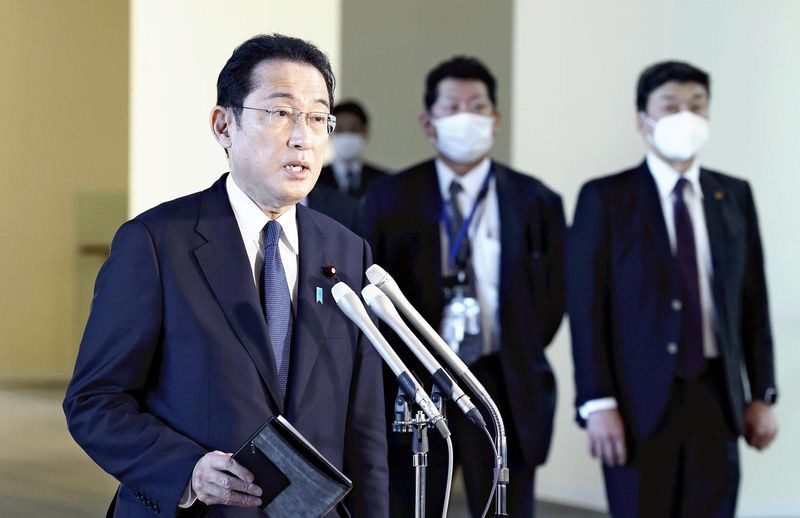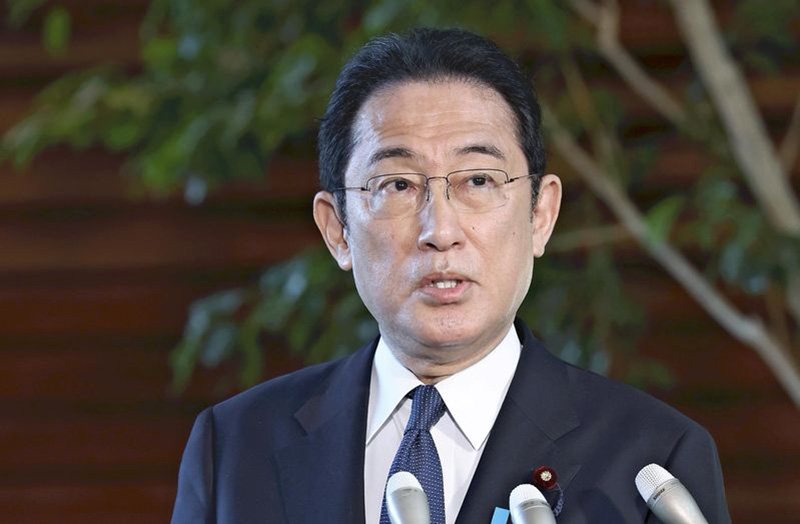Japan mulls sanctions on export of semiconductors to Russia as G7 eyes joint action

Prime Minister Fumio Kishida speaks to reporters at his office on Tuesday.
15:04 JST, February 22, 2022
The Japanese government has begun coordinating economic sanctions against Russia in the event of a military invasion of Ukraine, with a view to joining U.S.-led restrictions on exports of semiconductors and other products.
Japan plans to work together with the United States and other Group of Seven nations to put pressure on Russia if Moscow fails to accept efforts to ease tensions.
On Tuesday, Prime Minister Fumio Kishida “strongly condemned” Russia’s recognition of the independence of areas controlled by pro-Russian militias in eastern Ukraine, saying it was “a violation of Ukraine’s sovereignty and territorial integrity and cannot be accepted.”
In the event of a military invasion by Russia, he said, “We will closely monitor the situation and coordinate a strong response, including sanctions, in cooperation with the G7 and the rest of the international community.”

Prime Minister Fumio Kishida speaks to reporters at his office on Tuesday.
The export sanctions are expected to apply to high-tech products that use advanced technologies such as semiconductors, artificial intelligence and robotics.
Japan’s exports of semiconductors and semiconductor-related products to Russia are small and “the impact of the export restrictions on the Russian economy will be limited,” according to a Japanese government official.
However, it is believed that it would be difficult for Russia to procure such products from China as an alternative source. To harm Russia both militarily and economically, it would be necessary for countries to impose sanctions simultaneously, including Japan, which has the technology to develop such products.
In 2014, when Russia annexed Crimea in southern Ukraine, Japan imposed sanctions that effectively banned the export of weapons and general-purpose products that could be used for military purposes, referring to sanctions imposed by other major countries. The high-tech products targeted this time are expected to include not only those used for military purposes but also those used in civilian products, and the measures are likely to be stricter than in 2014.
The Japanese government is also considering imposing financial sanctions. In 2014, in addition to freezing the assets of Russian government officials, it effectively banned five major Russian banks from raising funds in Japan. It is highly likely that the government will take stronger measures this time.
However, like other G7 nations, Japan is cautious about issuing sanctions that would impact the energy industry. Japan imports about 10% of its liquefied natural gas (LNG) from Russia: sanctions would threaten the supply.
At the time of the 2014 invasion, Japan did not initially agree with the economic sanctions imposed by the United States and European countries, and instead, it opted to suspend negotiations on easing visa issuance requirements, among other things.
This time, the Japanese government is taking a joint stance with G7 members before an invasion has occurred to show that it will not allow the status quo to be changed by force, eying China’s continued expansion in the East and South China Seas and its increasing military pressure over Taiwan.
Top Articles in Politics
-

Japan PM Takaichi’s Cabinet Resigns en Masse
-

Sanae Takaichi Elected Prime Minister of Japan; Keeps All Cabinet Appointees from Previous Term
-

Japan’s Govt to Submit Road Map for Growth Strategy in March, PM Takaichi to Announce in Upcoming Policy Speech
-

LDP Wins Historic Landslide Victory
-

LDP Wins Landslide Victory, Secures Single-party Majority; Ruling Coalition with JIP Poised to Secure Over 300 seats (UPDATE 1)
JN ACCESS RANKING
-

Japan PM Takaichi’s Cabinet Resigns en Masse
-

Japan Institute to Use Domestic Commercial Optical Lattice Clock to Set Japan Standard Time
-

Israeli Ambassador to Japan Speaks about Japan’s Role in the Reconstruction of Gaza
-

Man Infected with Measles Reportedly Dined at Restaurant in Tokyo Station
-

Videos Plagiarized, Reposted with False Subtitles Claiming ‘Ryukyu Belongs to China’; Anti-China False Information Also Posted in Japan




















